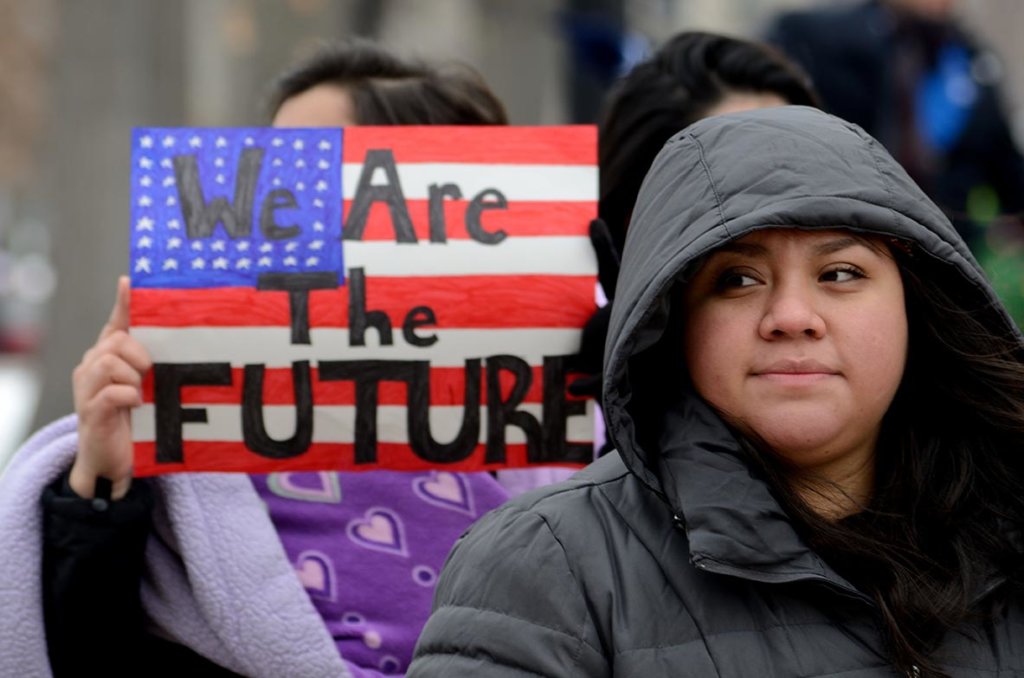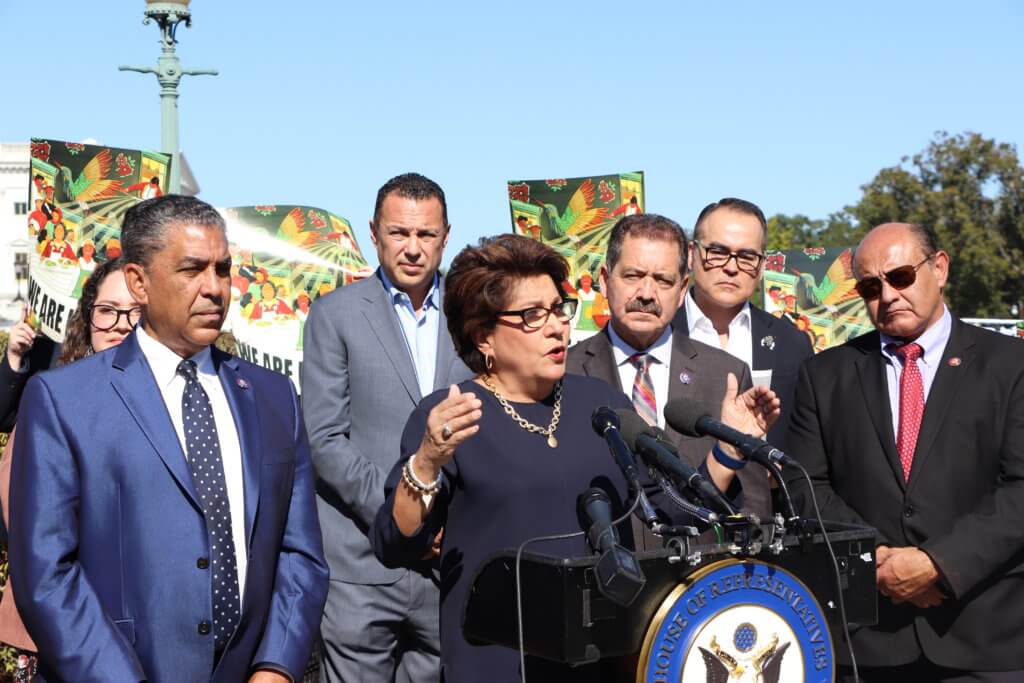Letter to Congress: It is imperative that full and equitable relief extends to all American families
February 18, 2021
| The Honorable Nancy Pelosi
Speaker U.S. House of Representatives |
The Honorable Charles SchumerKeep up with the latest from UnidosUSSign up for the weekly UnidosUS Action Network newsletter delivered every Thursday. Majority Leader United States Senate |
| The Honorable Kevin McCarthy
Minority Leader U.S. House of Representatives |
The Honorable Mitch McConnell
Minority Leader United States Senate |
Dear Speaker Pelosi, Majority Leader Schumer, Leader McConnell, and Leader McCarthy:
On behalf of UnidosUS, I write to urge you to build on the current draft of the COVID-19 relief bill, which is based on President Biden’s “American Rescue Plan,” to ensure that all workers, families, and children are considered in the final legislation. The recovery of the United States from the pandemic depends on the health and economic well-being of all who reside here, and it is imperative that full and equitable relief extends to all American families, including children of immigrants and families of mixed immigration status.
UnidosUS, previously known as NCLR (National Council of La Raza), is the nation’s largest Hispanic civil rights and advocacy organization and has built a stronger country by creating opportunities for Latinos for more than 50 years. Through its unique combination of expert research, advocacy, programs, and an Affiliate Network of nearly 300 community-based organizations across the United States and Puerto Rico, UnidosUS simultaneously challenges the social, economic, and political barriers at the national and local levels.
We applaud the vital investments included in the draft pandemic relief package to address the public health crisis, provide economic relief, prevent housing and food insecurity, and get students back to school safely. However, we are deeply concerned about the workers, families, and children who continue to be left out of proposals, including those who file federal income taxes with an Individual Taxpayer Identification Number (ITIN) and those children who were brought to the U.S. and are residing here without lawful status through no fault of their own. When members of mixed-status families are denied emergency support—an unusually harsh policy during a national crisis or disaster—it harms the well-being of the whole family, including the more than 5 million children who belong to these families. As you know, many of these tax-paying families are also overrepresented among frontline workers who are risking their own safety and that of their families to support the nation during the global pandemic. To protect public health and rebuild the economy, it is critical that mixed-status families have access to the same emergency supports as other American workers and families.
I applaud the House Committees for incorporating the following meaningful provisions:
- Vital health care funding to distribute COVID-19 tests and supplies, PPE, vaccines, and the drugs and devices necessary for treatment.
- Reduction in health care premiums for low- and moderate-income families by increasing the Affordable Care Act’s (ACA) premium tax credits.
- The extension of the 15% increase in Supplemental Nutrition Assistance Program (SNAP) benefits and the Pandemic Electronic Benefit Transfer (P-EBT) program to reduce hunger for millions of households, including children who are missing meals due to school closures.
- $1,400 in Economic Impact Payments for working families, including family members who are U.S. citizens or permanent residents.
- A gradual increase in the federal minimum wage to $15 an hour.
- Extension of temporary Unemployment Insurance benefits and an increase in the weekly pandemic benefit from $300 to $400.
- Expansion of the Child Tax Credit (CTC) and the Earned Income Tax Credit (EITC) for workers without children.
- Critical support for renters and homeowners to prevent evictions and foreclosures, including $100 million in housing counseling services.
- K–12 funding to support students’ and educators’ safe return to the classroom.
- Aid to colleges facing lost revenue following campus closures, including emergency assistance to students suffering hardships as a result of the pandemic.
While we welcome this progress, the budget reconciliation provisions moving through Congress continue to leave out some children and treat mixed-status families inequitably. This undermines economic stimulus and is clearly unfair considering the substantial sacrifices that undocumented essential workers continue to make to keep our country moving forward.
We strongly support affordable, accessible, and quality health coverage for all, including immigrants. But Latinos have long been overrepresented among the uninsured, and their numbers are growing under the pandemic. While full coverage may not be achievable in this emergency package, we urge you to include access to testing, vaccines, and treatment of COVID-19 regardless of insurance, immigration status, and ability to pay, as was included in the “Heroes Act.”
To provide the economic supports necessary to fuel an equitable recovery, families of mixed immigration status must fully qualify for stimulus payments, including workers who pay their taxes using an ITIN and their children, U.S. born and undocumented alike. Under the current House provisions, an estimated 9.3 million taxpaying individuals with an ITIN, including 940,000 children, would not receive stimulus payments. Likewise, the expansion of the EITC and CTC also excludes ITIN holders and undocumented children. According to an analysis of the Migration Policy Institute, even before the pandemic, children irrespective of status who belong to mixed-status families face higher rates of poverty and reduced socioeconomic progress than the overall U.S. child population. Full inclusion in stimulus payments is essential to the well-being of these families and children given that they entered the pandemic in a weakened economic position and do not have full and equitable access to other critical safety net programs such as Unemployment Insurance benefits, SNAP, Medicaid, and others.
We strongly support the emergency funding included to safely open schools, but request funding that supports Latino, immigrant, and English learner (EL) children in their education. Approximately 5 million students, or 10% of all public school students, are classified as ELs, and 77% of ELs are Latino, the majority of whom are U.S.-born. To meet the needs of these vulnerable students, we urge you to include $1 billion dedicated to Title III of the Elementary and Secondary Education Act, the only federal funding source dedicated to supporting ELs. For higher education students, we also urge you to extend federal student loan forbearance for a year and forgive no less than $10,000 in federal student debt.
UnidosUS appreciates the progress you have made in delivering urgent relief for working families. With our Affiliate Network of almost 300 organizations, we have strongly advocated for the “Heroes Act” and its inclusive provisions. Despite improvements in the draft House reconciliation provisions as compared to the CARES Act and the December-passed relief bill, too many Latinos and their families remain excluded. With leadership in all branches of government committed to these families and the rare opportunity of budget reconciliation to secure relief that reflects our shared values, now is the time for mixed-status families who contribute so much to our nation to receive the same relief as all other American families.
Sincerely,
Janet Murguía
President and CEO
UnidosUS


